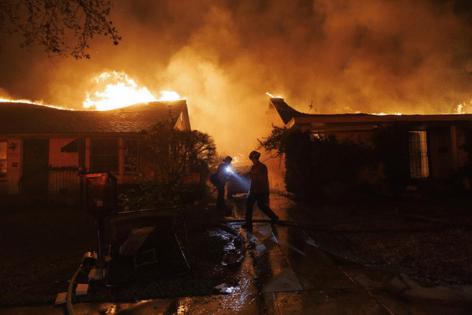Commentary: LA's fires report exposes America's broken alert system
Published in Op Eds
Los Angeles County officials dismissed their recent after-action report on the January wildfires as “inadequate.” For me, the McChrystal Report is a precise, comprehensive account of failure, revealing the nation’s system for alerting the public as little more than paper, pencil and prayer.
At its outset, the report drops you into the beating heart of the catastrophe: a massive scrum of firefighters and agency reps, all shouting against the wind and chaos. It was in the Unified Command Post, at the base of Eaton Canyon, that the L.A. County fire, sheriff and emergency management departments struggled to decide on, communicate and implement their evacuation decisions. Over the span of a single day, they made more than 200 decisions regarding the Palisades and Eaton fires. Each decision meant someone’s home, someone’s street, someone’s life was on the line.
However, the process among the group was primitive. Field commanders made decisions. Someone scribbled them down. Someone else relayed them by phone or text. Finally, staff keyed them into Los Angeles County’s mass-notification system. This chain of communication added at least 30 minutes to every alert — a wait that, in a wind-driven fire moving at freeway speeds, can become a death sentence for many.
This report confirms what has become increasingly clear in recent years, as we witness failure after failure: We don’t know how to execute emergency alerting in this country. For all our technology, for all our wealth, Americans face a dangerous future with hundreds of cumbersome, inconsistent and dangerously slow state and local systems duct-taped together. Unless we face this head on, more will needlessly die.
As an emergency manager for 25 years, I lead a team that last year alone issued more than 300 alerts and advisories on threats ranging from fires and floods to power disruptions and mass-casualty events, each ultimately reaching a large and diverse audience through our 53,000 leadership and staff members. The problems that cripple our national alerting system are entirely solvable. But we haven’t solved them because we’ve built the system on its weakest link. Our “all disasters are local” doctrine leaves thinly staffed local governments to carry a burden that no county, town or township can bear alone.
In the case of the Palisades fire, the local jurisdiction is a crisis manager’s worst-case nightmare: 10 million people packed into dense basins, hemmed in by mountains and coastal tsunami zones, crisscrossed with earthquake faults and overlaid with aging freeways and power lines.
And yet, its Office of Emergency Management has just 37 full-time staff. According to my “All Disasters Are Local” index, which explains how agencies can and must be properly resourced to meet the risks they face, it should have more than 200. This means the county operates with less than 20% of the resources needed. If a team that can effectively fit into a high school classroom is responsible for protecting a population larger than 40 U.S. states, that team will be overwhelmed long before the first spark is ignited. This is not incompetence. It’s inevitable.
Individuals must be held accountable to their assigned responsibilities. But if you want someone to blame, start with the elected officials who chronically underfund the mission — not the emergency managers struggling against impossible odds.
Another grim revelation in the report: The city of Los Angeles refused to cooperate with its authors. So, whatever changes the county makes will not mesh with those planned by the city. This is madness. Disasters do not respect jurisdictional boundaries, which is why local fixes will always fall short. We need a national solution.
The only way forward is a technology-based system that’s consistent across all levels of government — local, state and federal. We need a unified national framework for emergency alerting, one that automates slow relays, integrates field data directly and pushes geotargeted messages instantly to the public. Every American should know that no matter where they live, if danger comes, the warning will reach them quickly, clearly and reliably.
Every disaster leaves a brief window of opportunity to confront our failures. With respect to public warning, that window is now. This is not a Los Angeles problem. It’s not even a California problem. It affects us all. From Lahaina, Hawaii, to Paradise, Calif., to Kerr County, Texas, we’ve witnessed our expectations collapse under the weight of a system not built for the reality we face. We’ve seen this movie too many times. It’s time to change the ending.
____
Kelly R. McKinney is the vice president of Emergency Management and Enterprise Resilience at NYU Langone Health in New York City and the former deputy commissioner at the New York City Office of Emergency Management.
_____
©2025 Los Angeles Times. Visit at latimes.com. Distributed by Tribune Content Agency, LLC.
























































Comments